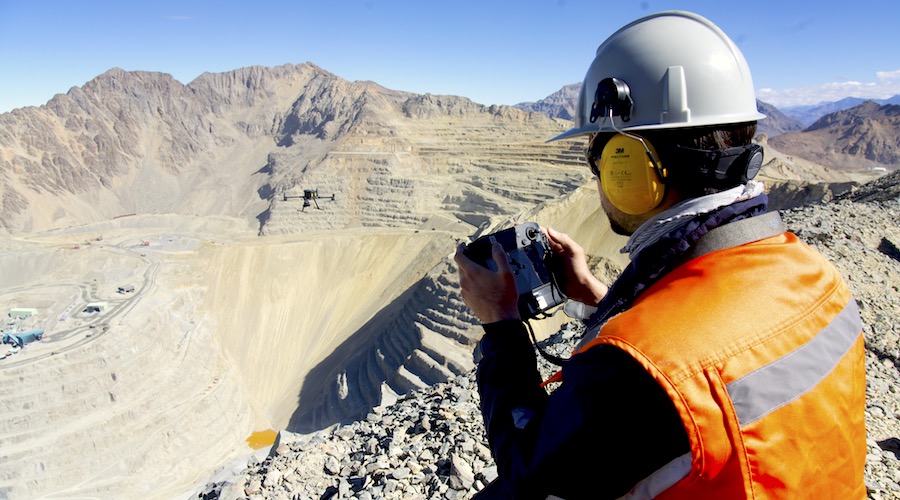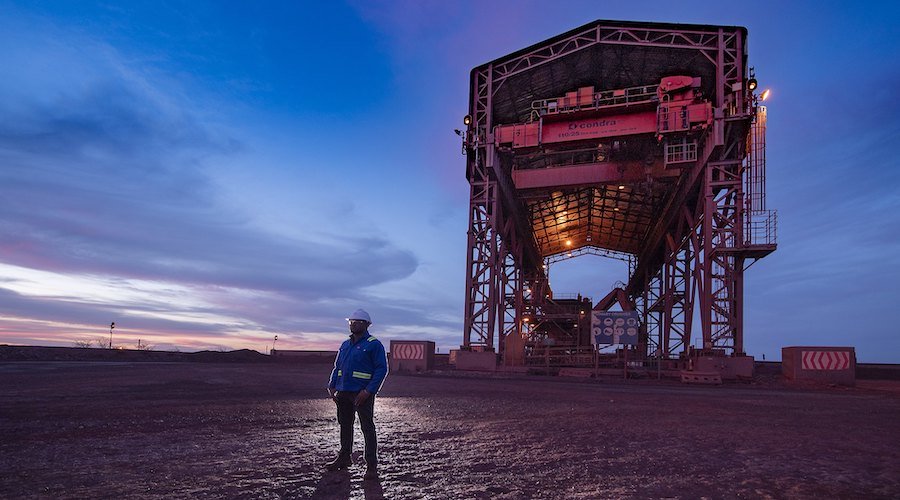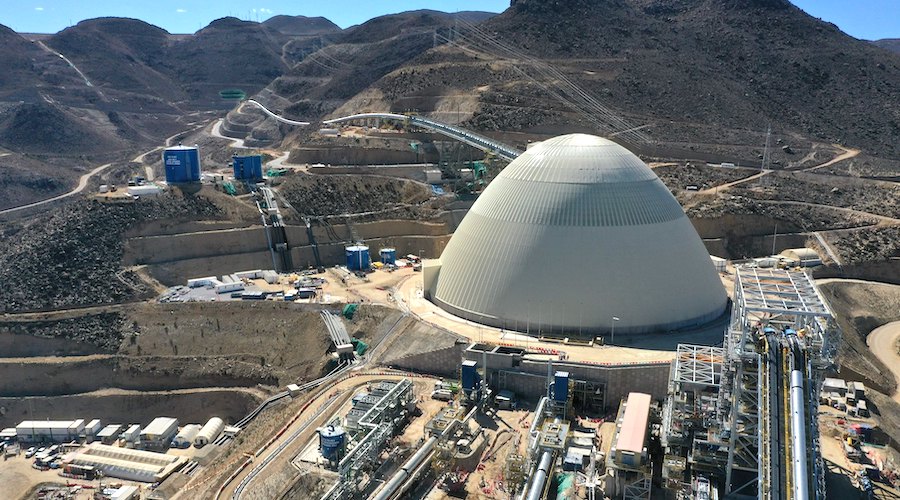The world’s largest miner wants to buy Anglo American, but only if its London-based peer divests Amplats and Kumba.
By MINING.COM Staff April 25, 2024

Los Bronces copper mine in Chile. Credit: Anglo American via Flickr
Glencore’s (LON: GLEN) semi-successful attempt to buy Teck Resources (TSX: TECK.A, TECK.B)(NYSE: TECK), Canada’s largest diversified miner, appears to have been just the beginning of a new wave of major mergers and acquisitions in the natural resources sector.
Now is BHP (ASX, LON, NYSE: BHP), the world’s largest miner, which has taken the lead, surprising markets with a £31.1 billion (US$39 billion) unsolicited bid for Anglo American (LON: AAL).
An electrified world has become increasingly dependent on battery metals, particularly on copper, and BHP is, not surprisingly, eager to secure a leading position in the market. A tie-up would give the mining giant about 10% of the global copper production. It would also boost its presence in the world’s top copper producing countries Chile and Peru, as with the acquisition of Anglo American, BHP would gain access to three of the world’s largest copper mines — Collahuasi (with ownership of 44%), Los Bronces (50.1%), El Soldado (50.1%) and Quellaveco (60%). This would improve the company’s exposure to copper by about 40%.
BHP’s proposal is valued at £25.08 per Anglo share, a 14% premium to the target company’s closing price on Wednesday. According to analysts, the offer is not as sweet as it seems and they believe Anglo American is well-positioned to push for a better deal.
Given its conglomerate nature, finding a knockout price isn’t a simple task.
“Anglo American is an established conglomerate with a complex structure, featuring numerous partial ownership stakes and various defensive mechanisms, most of which are concentrated in its South African assets,” Jefferies’ Christopher LaFemina wrote in a note to clients.
The expert believes that “a price of at least £28 per share would be necessary for serious discussions to take place, and a takeout price of well above £30 per share would be the outcome if other bidders were to get involved”.
“If we include our estimate of synergies on an after-tax present value basis, we estimate Anglo fair value to be 2824p per share, which equates to a $42.6 billion equity value. That is 28% above the most recent Anglo share price, and we believe it is a reasonable starting point.”
Anglo American has been a takeover target in recent years after output fell and costs mounted.
“It became a potential target for BHP as Anglo continued to post a weak top-line, even as its total debt kept increasing since 2021 as a result of the poor performance of platinum group metals (PGMs) and diamonds due to price fluctuations, geopolitical and economic situations, and other operational constraints,” Sathiya Narayanan Jalapathy, Business Fundamentals Analyst at GlobalData, wrote in an emailed statement.
“Amidst this, the company has reported a growth of 31.5% in copper sales from $5,599 million in 2022 to $7,360 million in 2023 … Operationally, the combined entity could have a top line of over $84 billion, EBITDA of over $34 billion, and a workforce of close to 100,000, reinforcing its position as one the largest global players in the mining sector,” he noted.
“The deal would represent the biggest shakeup of the global mining industry in more than a decade,” says James Whiteside, metals and mining research director at Wood Mackenzie. “But Anglo American shareholders may consider fair value closer to the share price in 2023 before operational issues emerged and other suitors may be compelled to act at this price”.
Berenberg analyst Richard Hatch is not convinced that Anglo presents significant turnaround opportunities

“BHP is potentially buying a group of assets that need some care and attention,” Hatch wrote, referring to Anglo’s operations in South Africa. “This, in our view, offers limited upside at this point with current valuation multiples that would also imply a slightly dilutive deal for BHP.”
“BHP is likely drawn by the company's low valuation (stock down 12% over the LTM), with the company going through a multi-year operational restructuring,” Fitch Group said. “From a strategic standpoint, bigger is always better in the metals and mining sector.”
"Highly opportunistic"
Earlier on Thursday one of Anglo’s 20 largest shareholders, Legal & General Investment Management, said BHP’s approach was "highly opportunistic" and “unattractive”.
“As with many other UK-listed companies, we believe the valuation of Anglo American to be depressed and regard the proposed exchange ratio as an unattractive proposition for long-term investors," Nick Stansbury, head of climate solutions at Legal & General Investment Management (LGIM), said in an emailed statement.
"The industry is extremely concentrated today, and further consolidating it will not contribute to accelerating investment in the way we believe is needed,” Stansbury said.
Anglo American did not respond to a request for comments but in a statement it said it was reviewing the proposal, which would require it to separate its majority holdings of Anglo American Platinum (JSE: AMS) and Kumba Iron Ore (JSE: KIO) beforehand.
Top miners are all about copper these days. BHP itself bought copper producer OZ Minerals last year for about $6.4 billion. Rio Tinto (NYSE: RIO; LSE: RIO; ASX: RIO), the world’s second largest miner, has been investing in copper mines in Utah and Arizona.
Deal under the microscope
BMO Capital analyst Alexander Pearce highlighted that the deal to combine both miners would be subject to significant anti-trust/competition scrutiny, particularly when it comes to the copper assets.
The Anglo-owned Quellaveco and BHP-owned Antamina mines are key to Peru’s economy. If the merger is successful, both operations would be under the same ownership, raising questions of a potential market concentration issue or even a major political concern.
The deal could face government and local opposition due to the scale and influence of the combined company. Depending on the nature of the perceived problem, the antitrust solution may involve selectively selling off parts of the business that are deemed non-essential, in order to address concentration issues, while preserving the core copper assets that both companies view as strategically important.

This is in South America. The issues the merged company could face in South Africa are equally or more difficult. The nation’s minerals resources minister is not a big fan of BHP and has already voiced his opposition to BHP’s bid for Anglo.
Gwede Mantashe told the Financial Times that he was not in favour of BHP's bid given the country’s previous "not positive" experience with the company. He was referencing to the 2001 merger between BHP and Billiton that created the world’s largest mining company.
While he clarified this was his personal opinion and not the government official position on the matter, Mantashe said that BHP Billiton “never did much for South Africa” and led to “capital leaving the country.”
BHP in 2015 created and spinned off South32 (ASX, LON, JSE:S32), a company that inherited the South African assets and operations.Through this demerger, BHP effectively reduce its exposure to the country in a move interpreted as many as BHP's attempt to limit its involvement in the country.
Anglo American, in contrast, embodies the mining tradition of South Africa. Being born in the country in 1917, it holds the fourth-largest position in the FTSE/JSE Africa All Share Index, accounting for 4.3% of the index.
Anglo has controlling interests in two other mining companies listed on the South African stock exchange — Anglo American Platinum Ltd., also known as Amplats, and Kumba Iron Ore.
The company also owns another South African emblematic company: Diamond giant De Beers, which Anglo acquired more than a decade ago.
Mining giant Anglo-American rejects BHP's US$39 billion takeover offer, says it's 'opportunistic'
The Associated Press APR 26, 2024
LONDON — U.K.-based mining giant Anglo American has rejected a 31 billion pound (US$39 billion) takeover offer from BHP Group, saying it significantly undervalues the company and its growth potential.
Anglo said Friday that its board unanimously rejected the “unsolicited” and “highly conditional” bid from BHP, which was announced a day earlier. The deal would create the world’s largest copper miner, with around 10 per cent of global output — a hugely lucrative market as the world transitions to clean energy.
Anglo said in a statement to the London Stock Exchange that the BHP proposal is “opportunistic” and “fails to value” the company's prospects.
“Anglo American is well positioned to create significant value from its portfolio of high quality assets that are well aligned with the energy transition and other major demand trends,” said chairman Stuart Chambers.
“Anglo American has defined clear strategic priorities, of operational excellence, portfolio, and growth, to deliver full value potential and is entirely focused on that delivery," he added.
Anglo American’s shares were steady Friday, having risen 16 per cent to 25.60 pounds the day before.
BHP, whose primary headquarters is in Melbourne, Australia, said Thursday that the deal would boost its production of copper as demand for the metal soars amid the shift to clean energy. Copper is widely used in electric vehicles, batteries and charging stations.
The combination would also increase BHP’s holdings of potash, a widely used fertilizer, and coking coal used in steel production.
Analysts said Anglo, which has big copper plants in Chile and Peru and also owns a majority stake in the world-famous De Beers diamond company, remains vulnerable to a higher takeover approach from BHP.
“The proposed deal would hugely reshape the business, and the Anglo board has suggested the current bid isn’t reflective of the opportunity,” said Sophie Lund-Yates, lead equity analyst at stockbrokers Hargreaves Lansdown: “There’s every chance BHP will come back to the table.”
Bloomberg News | April 25, 2024 |

Credit: Anglo American
When former boss Mark Cutifani left Anglo American Plc in mid-April 2022, things had rarely looked better for the century-old miner. Metals prices soared as the world emerged from lockdowns, the company had recently posted its best-ever annual profit and the popular industry veteran was handing over to a trusted lieutenant. Anglo stock hit a record the same day.

Two years later, the company’s reputation is in tatters. A series of missteps had sent its value plunging by half. And now industry heavyweight BHP Group is moving in.
BHP’s proposal to break up Anglo and cherry pick its best assets marks a humbling moment for the mining house founded by the storied Oppenheimer dynasty and owner of the iconic De Beers diamond business. While analysts broadly expect BHP will need to sweeten its offer — which valued Anglo at about $39 billion — the move is raising existential questions about the future of the company and whether it can continue in its current form.
For BHP, the crisis at Anglo has come at the perfect time. The smaller company, which owns a handful of the world’s most desirable copper mines, is suddenly vulnerable just as the industry leader is finally ready to flex its dealmaking muscles, after years of holding back.
And it’s not the only one — other big miners have also been shifting their focus back to acquisitive growth. Anglo has been underperforming at a time when money is pouring into the wider metals and commodities space, and rumors had swirled for months that the floundering miner was in play.
So when BHP chairman Ken MacKenzie picked up the phone to his counterpart at Anglo earlier this month to make his proposal, it was a call that Anglo had been expecting for months in some form or other, according to people close to the company.
“Anglo was the most-liked stock a couple of years ago,” said Ben Davis, an analyst at Liberum Capital. “Repeated guidance disappointments and relative underperformance of its commodity basket has left it vulnerable to approaches.”
In many ways, the seeds of Anglo’s troubles months were sown well before Cutifani’s triumphant exit.
Just days after he left, the company announced a major setback at its mines, with production falling and costs rising. And what initially looked like a one-off for an otherwise reliable producer spiraled out from there. Problems multiplied across the portfolio, while Anglo revealed a cost blowout at the flagship fertilizer project the company had bought a few years earlier.
The disasters continued to pile up. Many of the issues were outside of Anglo’s control — the diamond market imploded, platinum prices collapsed and rail and port problems in South Africa have squeezed exports from the company’s cash-cow iron ore business. Anglo is the only major miner with big platinum and diamond businesses and is particularly exposed to South Africa, which means it lagged rivals who weren’t dealing with the same hurdles.
As the pressures built, Anglo’s balance sheet was already stretched by its ambitious plan to build a fertilizer mine in the north of England. Unpopular with some investors, the project — long championed by new CEO Duncan Wanblad — kept getting more expensive and completion further away.
The real kicker came in December, during a routine update on Anglo’s business. Investors had been expecting cuts in South Africa, which were disappointing but not surprising.
But the market reacted in shock to a much bigger bombshell: Anglo’s South American copper mines — the company’s crown jewels — would need to slash production by roughly 20% to reduce costs. The shares cratered, plunging 19% in a single day.
The company has sought to turn the corner, telling investors it’s reviewing all its businesses. Anglo is open to selling its De Beers mining unit and looking for a partner for the big English fertilizer project.
But its weakness has left the company vulnerable. BHP has made a nonbinding proposal to buy Anglo in an all-share deal that valued the smaller company at about $39 billion based on Tuesday’s prices, BHP said in a statement on Thursday morning. Crucially, BHP wants Anglo to first split off the South African platinum and iron ore businesses, spinning them out to existing shareholders, before a takeover could happen.
Anglo said late Wednesday it was assessing the proposal, confirming it had received an approach after Bloomberg first reported BHP’s interest.
The move is a convoluted way for BHP to get its hands on Anglo’s coveted copper mines, and the clearest evidence yet that the largest producers are ready to dive back into dealmaking. The companies spent much of the past decade under a type of self-enforced ban, after a series of disastrous deals led to billions in writedowns and a cost a series of CEOs their jobs.
Now, flush with cash and having rebuilt investor trust, the industry is turning back to growth — and going in search of copper. The deal proposed by BHP would create by far the world’s biggest copper producer, just as demand for the energy transition is predicted to soar.
BHP CEO Mike Henry, who had transformed the company by getting out of oil and gas, was given a mandate by his board to seek transformational deals, and was already running the numbers on rivals including Freeport-McMoRan Inc. and Glencore Plc in early 2022, Bloomberg reported at the time.
One of the keys for BHP to pull off a deal for Anglo may lie in South Africa. The country’s state pension fund manager is Anglo’s biggest shareholder, and the group’s platinum and iron ore companies are two of South Africa’s biggest listed stocks. (Anglo is the majority owner of both but they have small free floats on the Johannesburg Stock Exchange.)
In a statement on Thursday, the Public Investment Corp. reiterated that the mining sector is of critical importance to the country and that any opportunities that arise need to take this factor into account.
Anglo has long links with the country: Founded in 1917 by entrepreneur Ernest Oppenheimer, Anglo American was built on the back of South Africa’s giant gold mines. Moving into diamonds with control of De Beers after Oppenheimer was elected to the board in 1926 — it owns 85% of the company after selling it and then buying it back — and then adding platinum and coal, Anglo grew rich and powerful through much of the 20th century.
As Apartheid sanctions bit, the company invested more in South Africa, becoming a sprawling conglomerate. Then, as international markets became accessible again, it rapidly grew overseas, building and buying coal mines in Australia, iron ore in Brazil and copper in Chile and Peru.
To be sure, this is not Anglo American’s first crisis. In 2015, the company almost collapsed amid huge debts and tumbling metal prices. Cutifani intially announced plans to sell half its mines, before backtracking as commodity prices recovered.
The difficulties at the time saw Indian billionaire Anil Agarwal grab a 20% stake in the company, which led to two years of deep speculation about his plans for the business. The tycoon ultimately walked away, unwinding his position.
While Anglo survived the attentions of Agarwal, the show of interest from the world’s biggest mining company may be more difficult to move past.
(By Thomas Biesheuvel)
Activist Investor Elliott to Build Stake in Anglo American After Failed BHP Bid
Mining giant Anglo American has rejected BHP Group’s £31.1bn proposal after it concluded the plan would undervalue its future prospects.
The talk of a potential mega-deal between BHP and London-listed miner Anglo American had the mining world’s attention this week, and it seems to have attracted the attention of activist investor Elliott Investment Management. Bloomberg has reported that the hedge fund, known for its activist campaigns, has acquired a $1bn (£800m) stake in the miner.
The news followed Anglo American’s announcement on Friday that it had rejected BHP’s proposal.
The announcement provided detail on the plan, which included an all-share offer for Anglo American by BHP and a requirement for Anglo American to complete two separate demergers of its entire shareholdings in Anglo American Platinum and Kumba Iron Ore to Anglo American shareholders.
The all-share offer and required demergers would be inter-conditional.
The Anglo American board concluded that the proposal significantly undervalued its future prospects.
The announcement followed warnings from South Africa’s minerals resources Minister, who said that his country’s previous experience with BHP was “not positive” in the wake of the group’s mega-deal bid for Anglo American.
In addition, the board believed the proposal contemplated a highly unattractive structure for Anglo American shareholders, given the uncertainty and complexity inherent in the proposal and significant execution risks.
Commenting on the news, Stuart Chambers, chairman of Anglo American said: “Anglo American is well positioned to create significant value from its portfolio of high quality assets that are well aligned with the energy transition and other major demand trends.”
The BHP proposal is opportunistic and fails to value Anglo American’s prospects, while significantly diluting the relative value upside participation of Anglo American’s shareholders relative to BHP’s shareholders.
“The proposed structure is also highly unattractive, creating substantial uncertainty and execution risk borne almost entirely by Anglo American, its shareholders and its other stakeholders. Anglo American has defined clear strategic priorities – of operational excellence, portfolio, and growth – to deliver full value potential and is entirely focused on that delivery,” he concluded.
Yesterday, South African minister Gwede Mantashe told the Financial Times that he did not back the £31.1bn bid as BHP’s 2001 merger with South Africa’s Billiton “never did much for South Africa.”
“What we saw is that it dumped coal and then created a small company called South32, which is now marginal,” he added, clarifying that his comments were not an official government position.
By Maria Ward-Brennan via CityAM
No comments:
Post a Comment